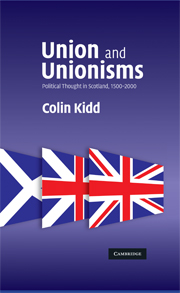Book contents
- Frontmatter
- Contents
- Preface
- 1 Introduction: the problems of Unionism and banal unionism
- 2 Unionisms before Union, 1500–1707
- 3 Analytic unionism and the issue of sovereignty
- 4 Narratives of belonging: the history and ethnology of organic union
- 5 From assimilationist jurisprudence to legal nationalism
- 6 The two kingdoms and the ecclesiology of Union
- 7 Early nationalism as a form of unionism
- 8 Conclusion
- Index
- References
5 - From assimilationist jurisprudence to legal nationalism
Published online by Cambridge University Press: 06 July 2010
- Frontmatter
- Contents
- Preface
- 1 Introduction: the problems of Unionism and banal unionism
- 2 Unionisms before Union, 1500–1707
- 3 Analytic unionism and the issue of sovereignty
- 4 Narratives of belonging: the history and ethnology of organic union
- 5 From assimilationist jurisprudence to legal nationalism
- 6 The two kingdoms and the ecclesiology of Union
- 7 Early nationalism as a form of unionism
- 8 Conclusion
- Index
- References
Summary
Jurisprudence constitutes one of the most important branches of unionist political thought in Scotland over the past three centuries. In chapter 3 we have already examined how Scots jurists parsed the particular problem of sovereignty within the field of constitutional law. This chapter takes a broader approach to Scots juridical thought within the Union, not only exploring constitutional questions regarding the status of Scots law, but also investigating the depth of commitment felt by Scots lawyers to the preservation of Scottish legal distinctiveness, attitudes to legal reform, including programmes to anglicise Scots law, interpretations of Scottish and British legal history, and the relationship of Scottish legal culture more generally to the politics of Union.
Although jurisprudence might seem at first sight to be a somewhat arcane branch of political thought, the unusual status of Scots law within the Union of 1707 means that the subject deserves special treatment. Articles XVIII, XIX and XX of Union appeared to guarantee the preservation of a Scottish legal system within the Union. Yet this was no more than a fragile semi-autonomy. Public law was a matter for the new British state, but Scots private law was to be preserved in its entirety. There was no attempt to define public or private law or to clarify the grey areas between them. The Union agreement was also silent on the question of whether Scots legal appeals might be brought to the British House of Lords from the supreme courts of Scotland, whether from the Court of Session in civil cases or the High Court of Justiciary in criminal trials.
- Type
- Chapter
- Information
- Union and UnionismsPolitical Thought in Scotland, 1500–2000, pp. 173 - 210Publisher: Cambridge University PressPrint publication year: 2008



